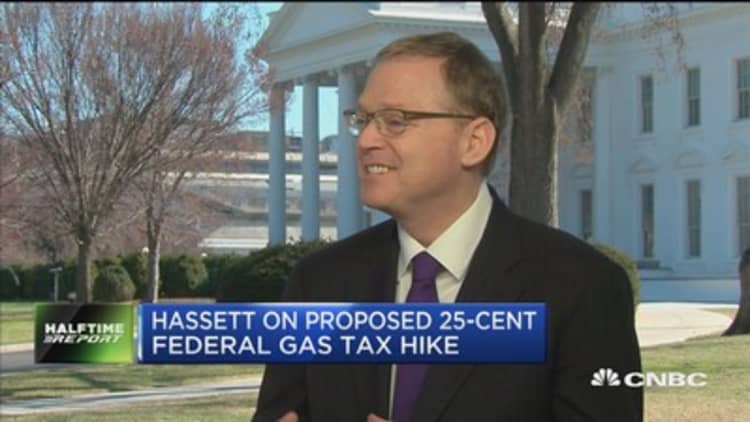
President Donald Trump's Council of Economic Advisers warned on Wednesday that taxing gasoline to pay for infrastructure improvements is an "imperfect" system.
The input from the president's top advisers on the economy comes after Trump proposed raising the federal gas tax by 25 cents to pay for his infrastructure plan. The idea has raised the hackles of some conservatives, who believe it could offset the benefit from recently passed GOP tax cuts and put Republicans in a tough spot ahead of midterm elections.
In a report released Wednesday, the Council of Economic Advisers raised a number of concerns about relying on taxes to pay for the nation's roadways.
"One of the things that we point out in the economic report to the president that came out today is that the gas tax's current design isn't really a 21st century design — that the gas tax was set at levels that were needed to fund highways back in the days when fuel economy was really low and we didn't have electric cars," Kevin Hassett, the council's chairman, told CNBC on Wednesday.
The 18.4-cents gasoline levy, which funds federal highway and mass transport spending, was last raised in 1993. Since then, inflation and rising fuel efficiency standards have eroded the purchasing power of funds raised through the tax.
The council's report says fuel taxes don't encourage efficient use of the nation's roads or reflect costs associated with congestion. The council notes that driving 100 miles on underused rural streets drums up the same tax revenue as driving the same distance on busy urban roads during rush hour.
Further, electric vehicles and highly fuel-efficient cars do not generate enough revenue from a gas tax to offset their wear and tear on roads, according to the council.
"Imagine if everybody drove a Tesla," Hassett said. "Then how is the gas tax going to be maintained to pay for the roads?"
Meanwhile, heavy trucks might not be paying enough in fuel taxes and fees to account for the disproportionate road damage, emissions and congestion they cause, the council says.
In their view, the case for paying for infrastructure through tolls is "solid," despite the higher administrative costs of collecting the fees. Tolls allow governments to collect funds from the people who use roads and bridges, and motorists and commercial truckers use them to the extent that the costs equal the benefits.
The advisers also highlight options like charging heavy trucks per distance traveled and allowing low-occupancy cars to travel in high-occupancy lanes for a fee. The federal tax on diesel is 24.4 cents.
Despite the issues the council raises with the gas tax, Hassett said that lawmakers should keep their options open.
" I think that the appropriate thing right now is to understand it's incredibly important to pass an infrastructure bill ... and that to do that you're going to need to fund it," he said.
"Right now, the president says that we should put the options on the table and think about them."


